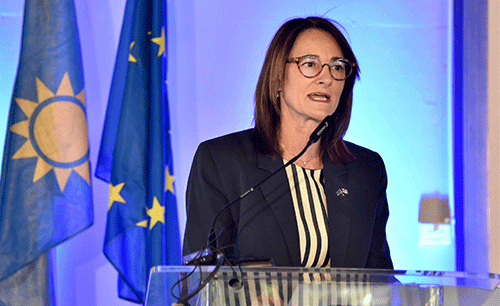The recent Namibia-EU Trade and Sustainability Conference highlighted significant opportunities for Namibia arising from European Union (EU) climate policies, particularly the Carbon Border Adjustment Mechanism (CBAM). This mechanism, which aims to level the playing field between EU producers and foreign exporters, presents a unique chance for Namibia to enhance its export capabilities in a carbon-constrained global market.
“The objective of CBAM is to level the playing field between EU producers and foreign producers. This initiative requires European importers to pay premiums on imports from carbon-intensive sectors, including steel, cement and hydrogen,” stated EU Ambassador to Namibia, Ana-Beatriz Martins.
As Namibia possesses favourable conditions for low-carbon industries, she noted the country stands to gain a competitive advantage in exporting these goods to the EU.
James Mnyupe, Namibia’s green hydrogen commissioner, emphasised the importance of this opportunity, saying this is one of the most fundamental economic opportunities of all time. This is as the CBAM not only incentivises local industries to decarbonise, but also aligns with Namibia’s ambitions in green hydrogen production.
The EU aims to import 10 million tonnes of green hydrogen by 2030, positioning Namibia as a potential key supplier due to its abundant renewable energy resources.
Moreover, the European Union Deforestation Regulation (EUDR), which takes effect in December 2025, adds another layer of opportunity.
This regulation mandates that products exported to the EU must not contribute to deforestation. Since Namibian charcoal and cattle exports already comply with sustainability standards, the country is well-prepared to meet these new requirements.
Martins noted that Namibian charcoal exporters are already FSC-certified, indicating strong alignment with EUDR standards.
Trade Minister Lucia Iipumbu was likewise upbeat. “This conference is a crucial step on our journey towards sustainable trade and environmental stewardship”, she noted.
She highlighted that aligning with EU standards will not only enhance trade relations, but also bolster Namibia’s global competitiveness.
The collaboration between Namibia and the EU extends beyond regulatory compliance; it encompasses substantial financial support for green initiatives. The EU has committed €1 billion through its Global Gateway strategy to support Namibia’s green hydrogen ambitions.
This funding is expected to facilitate investments in renewable energy projects, and help develop a robust green industrial sector.
As Namibia navigates these transformative changes, it is poised to attract investments, and create quality jobs for its youth. By embracing sustainable practices and leveraging its rich natural resources, the country can then emerge as a leader in green industrialisation on the global stage.



